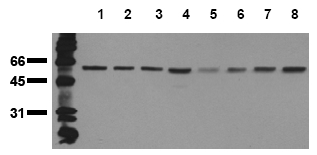Beclin 1 (BECN1) Mouse Monoclonal Antibody [Clone ID: 12B4]
Other products for "BECN1"
Specifications
| Product Data | |
| Clone Name | 12B4 |
| Applications | WB |
| Recommended Dilution | Immunoblotting: 0.5 µg/ml for HRPO/ECL detection. Recommended blocking buffer: Casein/Tween 20 based blocking and blot incubation buffer. Included Potitive Control: Cell lysate from untreated Neuro 2A (See Protocols for more details). |
| Reactivities | Canine, Human, Mouse, Rat |
| Host | Mouse |
| Isotype | IgG1 |
| Clonality | Monoclonal |
| Immunogen | Synthetic peptide conjugated to hemocyanin derived from Beclin sequence. |
| Specificity | This Monoclonal antibody recognizes Beclin at 52 kDa in Western-blot application. |
| Formulation | PBS containing 0.09% Sodium Azide, PEG, Sucrose and 50% Glycerol. State: Purified State: Liquid purified IgG fraction. |
| Concentration | 0.1 mg/ml |
| Purification | Subsequent Ultrafiltration and Size Exclusion Chromatography. |
| Predicted Protein Size | 52 kDa |
| Gene Name | Homo sapiens beclin 1, autophagy related (BECN1), transcript variant 1 |
| Database Link | |
| Background | Beclin 1 is a ubiquitous coiled-coil protein that plays a central role in autophagy. It interacts with several cofactors (Ambra1, Bif1 , UVRAG) to activate the lipid kinase Vps34, thereby inducing autophagy. In normal conditions, the BH3 domain of Beclin 1 is bound to, and inhibited by, Bcl2 or Bcl-X(L). This interaction can be disrupted by BH3-only proteins to induce autophagy. Nutrient starvation, a potent physiological inducer of autophagy, can stimulate the dissociation of Beclin 1 from its inhibitors, either by activating BH3-only proteins, such as Bad, or by post-translational modifications of Bcl2. Beclin 1 may play a role in anti-viral host defence, and protects against infection by a neurovirulent strain of Sindbis virus. Beclin 1 is also a haploinsufficient tumour suppressor. Genetic studies revealed that Beclin-1 has structural similarity to the yeast autophagy gene, atg6. Beclin-1 is part of a complex with class III PI3 kinase, Vsp34, that is responsible for autophagosome formation. |
| Synonyms | BECN1, GT197 |
| Note | Protocol: Positive Control: Cell lysate from untreated Neuro2A cells, brain endothelioma (Mouse) Format: Lyophilized cell lysate from serum starved Neuro 2A cells. Reconstitution: Restore by addition of 200 µl H2O. After complete solubilization add 200 µl 2x SDS-PAGE sample buffer, mix and incubate at 90°C for 5 min. Application: The positive control cell lysate is recommended for immunoblot applications. 20 µl of positive control cell lysate correspond to ca. 20.000 cells. Use 20 µl/lane (mini gel) for HRPO/ECL detection of the target proteins. Please NOTE: The lyophilized cell lysates conatin SDS and are not recommended for applications with native proteins such as in immunoprecipitation. Storage: Aliquote reconstituted product and store frozen. Avoid repeated fereezing and thawing. |
| Reference Data | |
| Protein Families | Druggable Genome |
| Protein Pathways | Regulation of autophagy |
Documents
| Product Manuals |
| FAQs |
| SDS |
{0} Product Review(s)
0 Product Review(s)
Submit review
Be the first one to submit a review
Product Citations
*Delivery time may vary from web posted schedule. Occasional delays may occur due to unforeseen
complexities in the preparation of your product. International customers may expect an additional 1-2 weeks
in shipping.






























































































































































































































































 Germany
Germany
 Japan
Japan
 United Kingdom
United Kingdom
 China
China



